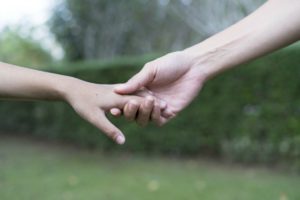Asking for Help Makes Us Better at Giving It
 Our culture here in the United States places a strong value on being self-sufficient. We have so much judgment around both giving and receiving–it shows up around giving and receiving practical help, giving and receiving emotional support, and honestly sharing our feelings.
Our culture here in the United States places a strong value on being self-sufficient. We have so much judgment around both giving and receiving–it shows up around giving and receiving practical help, giving and receiving emotional support, and honestly sharing our feelings.
How do you feel about asking for support? Or giving it? As you’re reading right now, notice what comes up for you when I ask these questions.
- What kind of person shares their feelings or what’s going on for them emotionally?
- What does it say about someone if they ask for help?
- How do you feel when someone shares their feelings?
- How do you feel when someone asks for your help?
- What does it say about you if you share your feelings?
- What does it say about you when you ask for help?
When I ask these questions in workshops, I often get answers like, “It feels good to be able to support someone when they need help,” and, “People who share their feelings are honest, authentic, and open.” And at the same time I hear… “If I ask for help it means I’m weak.”
We place value on being of service to other people, while simultaneously holding these judgments about ourselves when the shoe is on the other foot. As Brené Brown writes, “Until we can receive with an open heart, we are never really giving with an open heart. When we attach judgment to receiving help, we knowingly or unknowingly attach judgment to giving help.”
Human beings are not built, either physically, emotionally or spiritually, to exist on our own. We get the most out of life when we are engaged with other people.
From current research we’re seeing that people with more types of social relationships live longer and have less cognitive decline with aging, greater resistance to infectious disease, and better prognoses when facing chronic life-threatening illnesses.
Our cultural emphasis on giving without receiving doesn’t serve us. If you believe that we have a life purpose, if you believe that we have gifts we are meant to share with each other, then think about it…we can’t all be giving without anyone receiving. No one would accomplish their life purpose if that were the case. No one would have the fulfillment of offering what only they can offer if no one was open to receiving it. We benefit ourselves as well as each other when we can give and receive.
My grandmother once told me, the first lesson in life is to realize you can do it all yourself. The second lesson is to realize you don’t have to.
We may be trying to prove we are good people by not asking for help or support, trying to show that we have our life together and that we are easy to love by never needing anything and never sharing what’s true in our heart. But in fact we are already lovable and worthy of love just by being ourselves.
 When we give and give to show how good we are, we can end up giving more than we intended to give or more than we felt good about giving. That’s when we feel we start to feel resentful or even like other people are taking advantage of us.
When we give and give to show how good we are, we can end up giving more than we intended to give or more than we felt good about giving. That’s when we feel we start to feel resentful or even like other people are taking advantage of us.
When we don’t share ourselves – when we don’t share our feelings, when we aren’t honest about what we want and what we need, then it’s not possible for other people to truly know us. We can end up feeling alone or like we don’t belong because we haven’t given anyone the chance to know us and value us for who we are.
Asking for help or sharing your feelings doesn’t make you weak…it makes you resilient. It improves your physical, emotional, and mental well-being. It helps all of us to fulfill our life purpose. And it aids us in releasing some of our judgment about asking for support, so when the time comes we can be better at offering our support to others without the baggage around giving and receiving.
I invite you to look for a small opportunity today to honestly share your feelings or to ask for the help or support you’d like.
With love,
Susan




